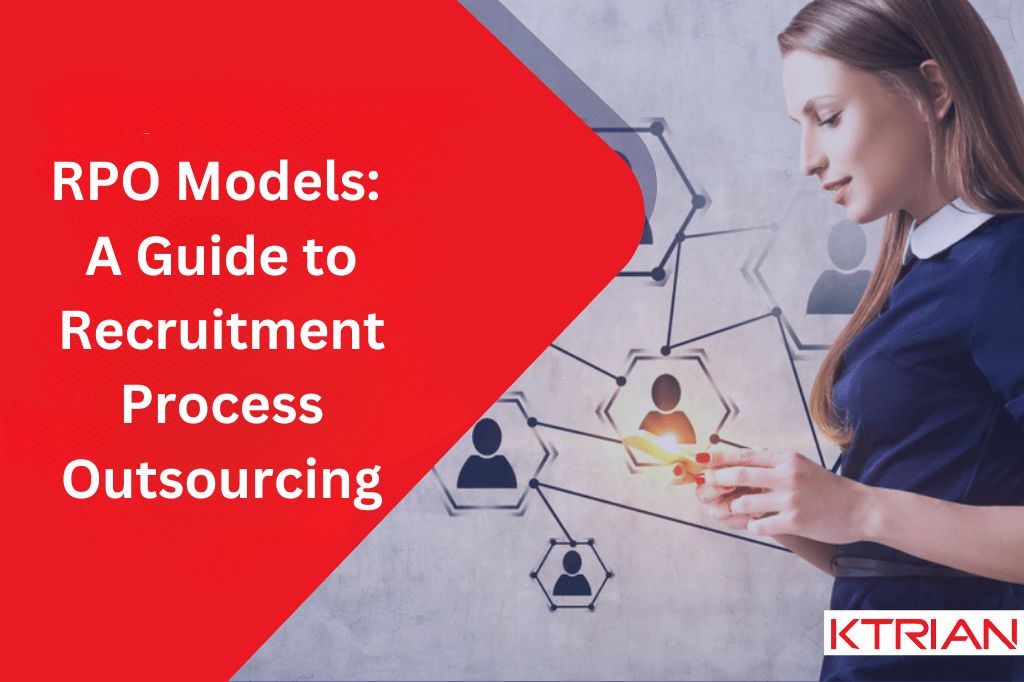RPO Models: A Guide to
Recruitment Process Outsourcing

Recruiting the right talent for a position can often be a daunting challenge. While there may be a pool of applicants, the key distinction lies between eligibility and true competence. In fact, finding candidates with the right skills and expertise is often more difficult than simply identifying qualified individuals.
This is where many organizations turn to external service providers to help streamline the process. Known as Recruitment Process Outsourcing (RPO Partner), this approach allows companies to outsource their hiring functions with minimal involvement from their internal HR teams. From candidate screening to final assessments, the entire recruitment cycle is managed by an external partner.
By opting for RPO services, companies can select a model tailored to their unique needs and objectives.
If you’re wondering: “What exactly is the RPO model in recruitment?” or “What business models are most effective for recruitment process outsourcing?” you’re not alone – these are common questions for businesses considering this strategy. In this blog, we are going to discuss about the different types of RPO models and trends shaping the recruitment market.
What are RPO Models?
Recruitment Process Outsourcing (RPO) is a strategic hiring model where an external partner manages part or all of a company’s recruitment functions. It has evolved from a simple hiring solution to a strategic partnership that transforms how organizations approach talent acquisition. Modern RPO providers don’t just fill positions – they integrate seamlessly with your organization, bringing specialized expertise, advanced technology, and proven methodologies to your recruitment process.
Understanding RPO Models in Depth
Full RPO (End-to-End Recruitment)
The most comprehensive solution in the RPO spectrum, Full RPO involves outsourcing your entire recruitment process. This model delivers significant advantages for organizations looking to transform their hiring approach:
- Complete management of the recruitment lifecycle
- Reduced operational costs and time-to-hire
- Access to advanced recruitment technologies
- Standardized hiring processes across locations
- Detailed analytics and reporting
- Improved candidate experience management
Organizations typically choose Full RPO when they need to reduce substantial recruitment costs or want their HR teams to focus on strategic initiatives rather than day-to-day hiring tasks.
Project RPO
Project RPO has emerged as a crucial solution for time-bound hiring needs. This model proves invaluable when organizations face specific recruitment challenges such as:
- New facility openings requiring multiple hires
- Major project launches needing specialized talent
- Geographic expansion into new markets
- Seasonal hiring spikes requiring temporary scaling
The model’s flexibility allows organizations to access expert recruitment resources without long-term commitments, making it ideal for project-based hiring needs.
On-Demand RPO
Business needs can change rapidly, and On-Demand RPO provides the agility organizations need in today’s fast-paced environment. This model offers:
- Scalable recruitment support based on current needs
- Quick access to recruitment expertise
- Cost-effective solutions for unexpected hiring spikes
- Flexibility to adjust resources as demands change
On-Demand RPO has become increasingly popular among organizations experiencing unpredictable growth patterns or seasonal fluctuations in hiring needs.
Function-Specific RPO
Some roles require specialized recruitment expertise that may not be available in-house. Function-specific RPO focuses on hiring for particular departments or skill sets, offering:
- Deep industry-specific knowledge
- Understanding of technical requirements
- Access to niche talent pools
- Specialized assessment methodologies
- Industry-specific compliance knowledge
This model works particularly well for technical positions, executive roles, or departments requiring specific need or domain expertise.
Hybrid RPO
The Hybrid RPO model offers organizations the best of both worlds – maintaining control over critical recruitment functions while outsourcing others. This model provides:
- Flexibility to keep strategic functions in-house
- Support for specific recruitment stages
- Scalable external expertise
- Integration with existing recruitment teams
Modern Trends Shaping RPO Models in 2025
The RPO market continues to evolve, influenced by technological advancements and shifting workforce dynamics. Here are the key trends defining RPO in 2025:
AI-Driven Recruitment
AI-powered tools are transforming recruitment by automating resume screening, enhancing candidate matching, and optimizing interviews. This not only reduces time-to-hire but also improves candidate quality of hire.
Data-Backed Talent Strategies:
Advanced analytics allow RPO providers to predict hiring demand, improve candidate engagement, and refine sourcing strategies using historical data.
Global Talent Acquisition:
With remote work becoming the norm, RPO providers are tapping into global talent pools, ensuring diverse and skilled hires through digital platforms.
Enhanced Candidate Experience:
Personalized communication, quicker feedback, and transparent processes are now essential in attracting top talent.
Focus on Upskilling:
RPOs are partnering with companies to offer training solutions, bridging skill gaps, and preparing workforces for future challenges.
Selecting the Right RPO Model
Choosing the appropriate RPO model requires careful consideration of several factors:
- Internal Assessment
- Current recruitment challenges and bottlenecks
- Annual hiring volume and patterns
- Geographic spread of operations
- Budget constraints and cost objectives
- Desired level of control over recruitment
Partner Evaluation
- Industry expertise and track record
- Technology capabilities and integration
- Cultural alignment and understanding
- Scalability and flexibility
- Quality of candidate experience
Maximizing ROI from Your RPO Partnership
To ensure success with your chosen RPO model:
- Establish clear goals and metrics for success
- Maintain open communication channels
- Regular performance reviews and adjustments
- Invest in proper integration and training
- Focus on continuous process improvement
Conclusion
The right RPO model can transform your recruitment process from a challenge into a strategic advantage. Whether you need comprehensive recruitment support or assistance with specific functions, there’s an RPO model that can align with your organizational needs and goals.
Success in implementing an RPO solution comes from careful selection of both the model and partner. Focus on finding a provider who not only understands your industry and culture but also has the expertise and technology to deliver results. With the right RPO model in place, you can create a more efficient, effective, and scalable recruitment process that drives your organization’s growth and success.
Team KTRIAN brings over a decade of expertise in delivering customized RPO solutions across industries. With a proven track record of successful placements, advanced technological infrastructure, and a team of specialized recruiters, Team KTRIAN partners with organizations to transform their recruitment processes and deliver exceptional talent acquisition results.
Written By

Nirali Mehta
Author
Last Update
19/02/25 06:00 PM
Category
Share
-
Facebook
-
Twitter
-
Linkedin
